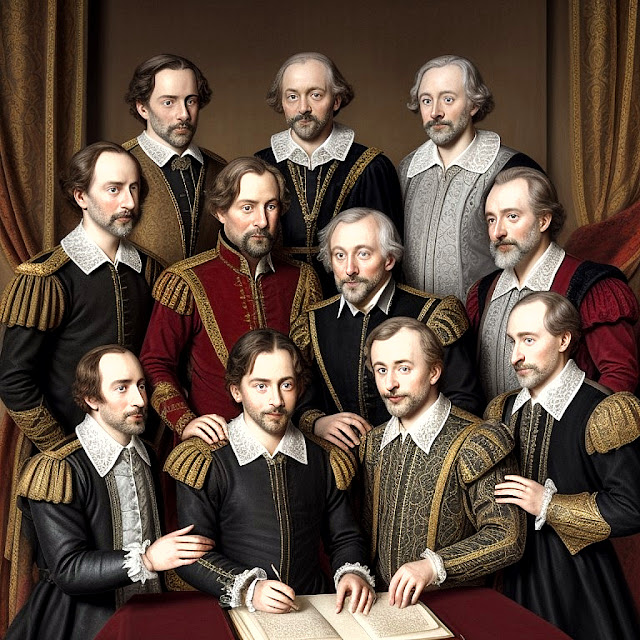A Tempestuous Tapestry: Shakespeare, de Vere, and the Elizabethan Quills' Conspiracy
The London stage, ablaze with candlelight and teeming with intrigue, is not just a platform for bawdy comedies and historical dramas. It's a battleground where whispered suspicions swirl into venomous accusations, and the very question of authorship erupts into a tempestuous tapestry woven with brilliant, turbulent threads. In this intricate game, where shadows shift and identities blur, William Shakespeare, the Stratford enigma, and Edward de Vere, the aristocratic phantom, are merely the headliners. For lurking in the wings, their quills poised and voices hushed, are Thomas Nashe, the sardonic pamphleteer; Robert Greene, the dissolute bohemian; and Gabriel Harvey, the enigmatic scholar – each harboring secrets and wielding words like poisoned daggers.
Shakespeare, the enigmatic upstart, stuns audiences with his mastery of language, his plays pulsating with the raw energy of the streets and the refined grace of the court. Yet, whispers murmur that his meteoric rise is too swift, his knowledge of lofty matters too profound for a mere glove-maker's son. Enter de Vere, the exiled Earl of Oxford, shrouded in a cloak of scandal and brilliance. His own literary talents, though largely unpublished, are undeniable. Some, like the mischievous Nashe, even hint at a clandestine collaboration, a hidden hand guiding the Bard's pen.
But the stage is crowded with contenders. Greene, once Shakespeare's friend, now consumed by envy and embittered by his own failures, lashes out in pamphlets, accusing the Bard of plagiarism and threatening to expose him as a "borrowed plume." Harvey, the erudite pedant, adds fuel to the fire, his barbed critiques hinting at secret knowledge of a literary cabal at the heart of London's theatrical scene.
As accusations fly and alliances shift, the lines between authorship and appropriation blur. Could Shakespeare, a sponge absorbing the zeitgeist of his era, have unknowingly incorporated fragments of others' works, echoes of conversations in smoky taverns and stolen moments backstage? Did de Vere, the ghost in the machine, whisper lines and plot twists, his identity veiled by circumstance and social constraints? Or was it a collaborative dance, fueled by shared anxieties and ambitions, where boundaries dissolved and ideas flowed like intoxicating ale?
The evidence, like scattered clues in a Jacobean mystery, is tantalizingly ambiguous. Stylistic echoes dance between plays and poems, whispers of shared experiences and veiled references to courtly scandals. Nashe's biting wit finds echoes in Shakespeare's tavern brawls, while Greene's bitter cynicism seems to seep into the Bard's darker tragedies. Harvey's classical allusions and intricate wordplay resonate in de Vere's known writings, adding fuel to the speculation of a hidden scholarly hand guiding the theatrical beast.
But definitive proof remains elusive, a phantom forever flitting beyond reach. Shakespeare's own life, shrouded in relative obscurity, offers few concrete answers. De Vere's hidden manuscripts, if they ever existed, lie buried in forgotten vaults, their secrets whispering from the dust. And the voices of Nashe, Greene, and Harvey, silenced by time and circumstance, leave behind only tantalizing hints, their motives as ambiguous as their prose.
Ultimately, the "authorship question" transcends mere attribution. It becomes a portal into the throbbing heart of Elizabethan England, a world where patronage and power played a complex game, and where literary genius could emerge from unexpected corners. Was Shakespeare a solitary comet blazing across the theatrical sky, or was he part of a constellation, each star influencing the light and trajectory of the others?
Perhaps the answer lies not in finding a single authorial hand, but in embracing the collaborative spirit of the age. Nashe's wit, Greene's bitterness, Harvey's erudition, and de Vere's aristocratic perspective might have danced around Shakespeare's theatrical bonfire, their whispers and suggestions shaping the flames. And in these swirling currents of influence, in this tempestuous tapestry woven with quills and secrets, lies the true magic of Elizabethan literature.
So, dear reader, as you raise your curtain on this literary mystery, remember: the answer may not be a single name, but a chorus of voices, a symphony of talents, echoing through the centuries, reminding us that the greatest stories are often woven from the threads of collaboration, conspiracy, and the enduring power of the written word.
Unlikely Buddha 2024



Comments
Post a Comment